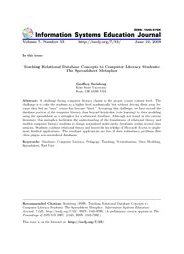Volume 7
Volume 7, Number 53 |
June 10, 2009 |

|
Geoffrey Steinberg
|
Abstract: A challenge facing computer literacy classes is the proper course content level. The challenge is to take the students to a higher level academically but without driving them away because they feel an “easy” course has become “hard.” Accepting this challenge, we have moved the database portion of the computer literacy class beyond keystrokes (rote learning) to data modeling using the spreadsheet as a metaphor for a relational database. Although not found in the current literature, this metaphor facilitates the understanding of the foundations of relational theory and enables computer literacy students to design normalized multi-entity databases within several class sessions. Students combine relational theory and keystroke knowledge of Microsoft Access to implement finished applications. The resultant applications are free of data redundancy problems that often plague non-normalized databases.
Keywords: Database, Computer Literacy, Pedagogy, Teaching, Normalization, Data Modeling, Spreadsheet, End User
Download this issue: ISEDJ.7(53).Steinberg.pdf (Adobe PDF, 13 pages, 626 K bytes)
Preview the contents: Steinberg.j.txt (ASCII txt, 37 K bytes)
Recommended Citation: Steinberg (2009). Teaching Relational Database Concepts to Computer Literacy Students: The Spreadsheet Metaphor. Information Systems Education Journal, 7 (53). http://isedj.org/7/53/. ISSN: 1545-679X. (A preliminary version appears in The Proceedings of ISECON 2007: §1545. ISSN: 1542-7382.)